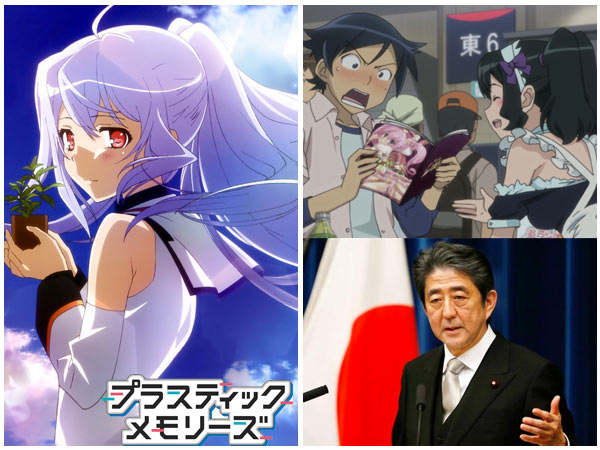In addition to trying to revive the Japanese economy through his “Abenomics” reforms (which have had the effect of making anime goods cheaper for all of us due to the weakening yen), Prime Minister Shinzo Abe has been trying to make sure Japan is included in the Trans-Pacific Partnership (TPP), a proposed free-trade agreement which would remove barriers between twelve nations around the Pacific region. I saw some discussion online about the potential for the TPP, which also tries to streamline copyright rules, to bring about the end of Japan’s rather unique subculture of doujinshi, underground fan-made comics that parody everything from Amagi Brilliant Park to WWII ship girls to, erm, Frozencest. Personally, I’m not worried in the least, thanks to the wonderful Japanese mechanism of 建前 tatemae (ta-te-mah-eh), which means “façade” (as in, the front of a building) but which also describes the Japanese tendency of doing something on the surface but not deep down, where it counts. Some good examples of tatemae in Japanese society include the way gambling is officially illegal, yet patrons of Pachinko establishments can win “valuable prizes” which they can conveniently sell for cash at a small building next door, or the soapland (a semi-legal place where men pay women to wash their bodies) in Shibuya which stands not 20 feet from a police station. The opposite of tatemae is 本音 honne (hone-neh), meaning the truth, the way people really think. In the event that the TPP caused new rules related to Japan’s doujin underground to be made, I have full confidence that these rules would be followed on the surface (tatemae) yet nothing would actually change in the end (honne).
One thing I’ve always been impressed with is the quality and depth of the stories found in many anime series, which often feature hardcore SF and dramatic themes (Knights of Sidonia, Planetes) that redefine whole genres, from cyberpunk (Ghost in the Shell) to time travel/time dilation (Steins;Gate, Voice of a Distant Star). It wasn’t always this way. Back in the 70s and 80s, animation in the U.S. was under constant attack from parents’ groups who objected to awesome shows like Hannah-Barbara’s masterpiece Jonny Quest for not being sufficiently “family-friendly” (because they told, you know, interesting stories that were exciting to watch). Recently I started Plastic Memories, about a future in which extremely human-like androids called “giftia” live alongside us, but due to a limitation in their technology, they can only live for 9 years and 4 months before they must be collected and destroyed. The story begins as the main character Tsukasa joins the Terminal Service section of the SAI Corporation, his job being to collect androids who have reached the end of their service period, which he does alongside his partner Isla. Isla is a giftia herself, and it’s pretty clear that the story is headed for a dark place that will no doubt evoking many otaku tears.
JAST USA and J-List have been hard at work to clear our backlog of games and get them where they belong, into the hands of dedicated visual novel fans. In addition to recently shipping the Nitroplus “sword opera” Hanachirasu and the total remake of Kana Imouto and announcing the upcoming Starless, we’re now taking the wraps off the Limited Edition for Shiny Days. It’ll be great: a large Japan-style box, with the massive game (18GB on two dual layer DVDs), a 48 page artbook, original mouse pad and more. Preorder your copy now!

















